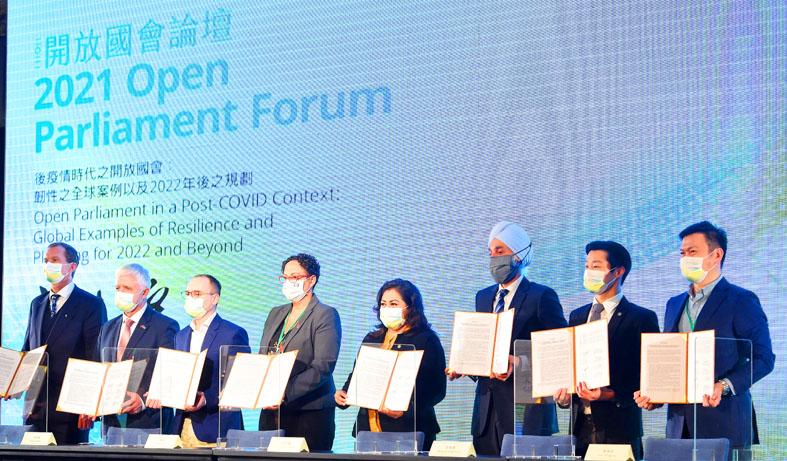Taiwanese and foreign lawmakers yesterday vowed to defend democracy and freedom, and counter disinformation, as they signed a joint statement at the closing of the Open Parliament Forum in Taipei.
The statement was signed by six foreign and Taiwanese legislators: Belizean House of Representatives Speaker Valerie Woods; Estonian lawmaker Juri Jaanson, who chairs the Estonian Support Group of Taiwan; Latvian Parliamentary Group for the Support of Taiwan chairman Janis Vucans; Lithuanian Parliamentary Group for Relations with Taiwan chairman Matas Maldeikis; Mexican Senator Nadia Navarro Acevedo; and independent Legislator Freddy Lim (林昶佐) from Taiwan.
It was also signed by Hsiao Hsin-cheng (蕭新晟), who is a member of the Taiwan Open Parliament Multi-Stakeholder Forum, and US National Democratic Institute Asia-Pacific regional director Manpreet Singh Anand.

Photo: Liu Hsin-de, Taipei Times
The signing ceremony was witnessed by Legislative Yuan Secretary-General Lin Jih-jia (林志嘉) and Minister of Foreign Affairs Joseph Wu (吳釗燮).
The signatories affirm their commitment to enhancing legislative openness and creating spaces for dialogue in full support of Taiwan’s first Open Parliament Action Plan 2021-2024, the statement said.
They are seeking to raise awareness of infringements on minority rights in the Asia-Pacific region and worldwide, and enable inclusive engagement of indigenous people, ethnic minorities and marginalized communities, including women, youth, LGBTQI+ individuals and people with disabilities, it said.
The signatories also aim to boost adherence to democratic norms through open parliamentary actions in response to challenges posed by illiberal influence operations, it said.
“Taiwan is the first country that is not a member of the Open Government Partnership, but is able to hold this event in Asia,” Wu said in his closing speech, describing the forum as a “monumental event.”
“We understand Taiwan’s democracy is not perfect, and our government, including the LY [Legislative Yuan], may not be as open and responsible as we decide to be,” he said. “But I can tell you that Taiwanese people never turn back after we embark on the road of democratization.”
“Taiwan has been seriously challenged by authoritarianism, which seems to be determined to crush our democracy through military coercion and hybrid warfare,” he said. “But we will never, never, never give in to authoritarianism. We have confidence that democracy will prevail at the end, and Taiwan will also prevail because we are a democracy.”
Saluting European participants from countries that are facing coercion from authoritarian neighbors, Wu said: “You are our beacon.”
The forum marks “a new beginning for democracies around the world to work together as one,” he added.

The Central Election Commission has amended election and recall regulations to require elected office candidates to provide proof that they have no Chinese citizenship, a Cabinet report said. The commission on Oct. 29 last year revised the Measures for the Permission of Family-based Residence, Long-term Residence and Settlement of People from the Mainland Area in the Taiwan Area (大陸地區人民在台灣地區依親居留長期居留或定居許可辦法), the Executive Yuan said in a report it submitted to the legislature for review. The revision requires Chinese citizens applying for permanent residency to submit notarial documents showing that they have lost their Chinese household record and have renounced — or have never

Taiwan has secured another breakthrough in fruit exports, with jujubes, dragon fruit and lychees approved for shipment to the EU, the Ministry of Agriculture said yesterday. The Animal and Plant Health Inspection Agency on Thursday received formal notification of the approval from the EU, the ministry said, adding that the decision was expected to expand Taiwanese fruit producers’ access to high-end European markets. Taiwan exported 126 tonnes of lychees last year, valued at US$1.48 million, with Japan accounting for 102 tonnes. Other export destinations included New Zealand, Hong Kong, the US and Australia, ministry data showed. Jujube exports totaled 103 tonnes, valued at

A magnitude 5.6 earthquake struck off the coast of Yilan County at 12:37pm today, with clear shaking felt across much of northern Taiwan. There were no immediate reports of damage. The epicenter of the quake was 16.9km east-southeast of Yilan County Hall offshore at a depth of 66.8km, Central Weather Administration (CWA) data showed. The maximum intensity registered at a 4 in Yilan County’s Nanao Township (南澳) on Taiwan’s seven-tier scale. Other parts of Yilan, as well as certain areas of Hualien County, Taipei, New Taipei City, Taoyuan, Hsinchu County, Taichung and Miaoli County, recorded intensities of 3. Residents of Yilan County and Taipei received

BIG SPENDERS: Foreign investors bought the most Taiwan equities since 2005, signaling confidence that an AI boom would continue to benefit chipmakers Taiwan Semiconductor Manufacturing Co’s (TSMC, 台積電) market capitalization swelled to US$2 trillion for the first time following a 4.25 percent rally in its American depositary receipts (ADR) overnight, putting the world’s biggest contract chipmaker sixth on the list of the world’s biggest companies by market capitalization, just behind Amazon.com Inc. The site CompaniesMarketcap.com ranked TSMC ahead of Saudi Aramco and Meta Platforms Inc. The Taiwanese company’s ADRs on Tuesday surged to US$385.75 on the New York Stock Exchange, as strong demand for artificial intelligence (AI) applications led to chip supply constraints and boost revenue growth to record-breaking levels. Each TSMC ADR represents